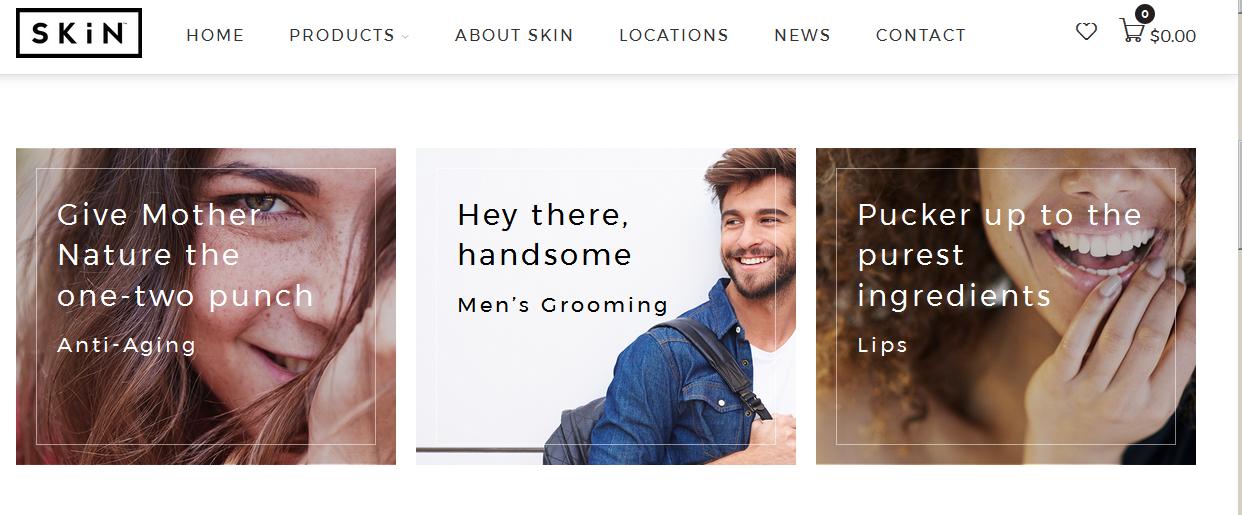One of the best ways to make sure that shoppers who find your company seek it out again is to establish a consistent and distinctive personality.
Just as people might be brash, witty, cheery, brooding, or refined, companies can be bossy, empathetic, fanciful, breezy, or rough around the edges — or have any one of dozens of other personality traits. In the same way that a blah person doesn’t usually attract us as a possible friend, a nondescript company doesn’t stick in our minds as one we yearn to do business with repeatedly.
When a company has personality, it jumps off the page (or screen), and that personality shows up in everything from dominant colors to images, fonts, and slogans. Personality is the attitude or set of attitudes that comes across consistently as we read, scan, and shop. Words are central to this process.
Audacious
For example, in both wording and design, SkinKC, which sells its own brand of natural skin care products, is decidedly audacious. Here, for example, are extracts from a few different product descriptions:
- Finally! An all natural deodorant that works! No funky smells that just cover up odor!
- This bold face wash dares to strip down to only the essential ingredients your skin craves.
- Lip balm with a natural smack. Apply to lips for tingly, shiny goodness.
- This isn’t a lotion, it’s a rescue mission!
- You have a wild side, but your beard shouldn’t.
Each of those passages — there are dozens of others — contains at least one word or phrase we wouldn’t expect from a buttoned-down business: “funky,” “dares,” “craves,” “smack,” “rescue mission,” “wild side.” More than that, what comes through is an irreverent, almost naughty lightness that makes you want to pamper yourself with great-smelling, wonderful-feeling, fun-to-have products.

Notice the brash phrasing on SkinKC’s home page: “one-two punch,” “Hey there, handsome,” “Pucker up.”
Peace and Love
Now consider another organic skin care company, OHA, with a “peace and love” vibe. Instead of a spunky personality, it conveys tranquility and quiet vitality in its pastel color scheme, spacious layout, and soothing word choices, such as in this product description:
OHA’s Seaweed Vitality Serum is a silky gel serum that glides on, leaving skin moisturized and soft. Our serum gel is derived from a trio of Kombu, Wakame, and Agar Seaweeds. This serum instantly re-mineralizes your skin, feels as light as a feather, and is powerfully hydrating — leaving skin moisturized for hours. The scent is fresh and alive; reminiscent of the sea, with hints of Green Tea and Eucalyptus. We add in Aloe Vera, Green Tea Extract, nutrients of Vitamin C & E, MSM, and a kiss of Sea Flower Essences of Brown Kelp.
Language like “silky,” “glides,” “alive,” “reminiscent,” “sea,” “hints,” and “a kiss of…” is sensual, soft, evocative, and glowing. And many of the product names continue the theme, such as “7 Flowers Regenerative Mist,” “Calming Face Cream,” and “Peace on Earth” perfume.
A quiet, rich calm comes across in this product description, for “Dear Friend” perfume, from OHA. It reads, in part, “Designed to evoke the feelings of love and comfort of being with someone dear. Imagine sharing a cherished beverage on a lazy and languid afternoon.”
When you have successfully created a personality for your brand and online store, consumers notice that you’re different. They either resonate with it or not. And that is why some entrepreneurs hesitate to go down that road. With a definite personality, you are not for everyone. Some people looking for natural skin care would rather buy from the audacious shop than from the laid-back one, and vice versa.
Yet as long there are shoppers who appreciate your set of beliefs, preferences, and attitudes, and you carry it through consistently, you are normally much better off. The distinctive energy makes your shop more appealing, more memorable, and more worthy of recommendation. These are all advantages that bland, no-personality establishments are missing.
A Short Profile
What works best is arriving at a personality you can sum up in one to three words — a profile of attitude and behavior that is not already identified with a prominent competitor and that your founder and key executives embody with authenticity.
That personality, in turn, should inspire some elements that are unexpected and delightful for the intended consumers. Besides color, layout, and wording, those elements might also include music, an ideal spokesperson, or promotional videos that fit your company’s personality but wouldn’t fit others, such as scientists in lab coats, cartoon animals, scenes of gentle waves, sleek luxury cars, or kids doing somersaults.
A militant roughness reigns throughout Doomsday Prep, a retailer of survival gear, even in its email invitation pop-up: “I want to survive!” — other sites write “Submit.”
Be Unique
Don’t copy another company’s personality!
Once you have the personality selected, implement it in every way you can think of, and keep it that way for at least several years. Big companies often create a “brand bible,” with detailed guidelines of dos and don’ts for colors, fonts, phrasing, and lifestyle cues. But a smaller company can maintain consistency by sticking to an easily remembered design palette and that core personality, expressed in one to three words.
Also selling survival supplies, Homesteader’s Supply stresses down-home sincerity.
Words Are Key
Many of the online stores I looked at for this article had almost no wording on their home page, only an array of product images, product names, and prices. Design without words can create a style, but it’s the unexpected word choices in headlines, product descriptions, and even navigation categories and opt-ins that give visitors the feeling of an entity that they may want to have a relationship with.